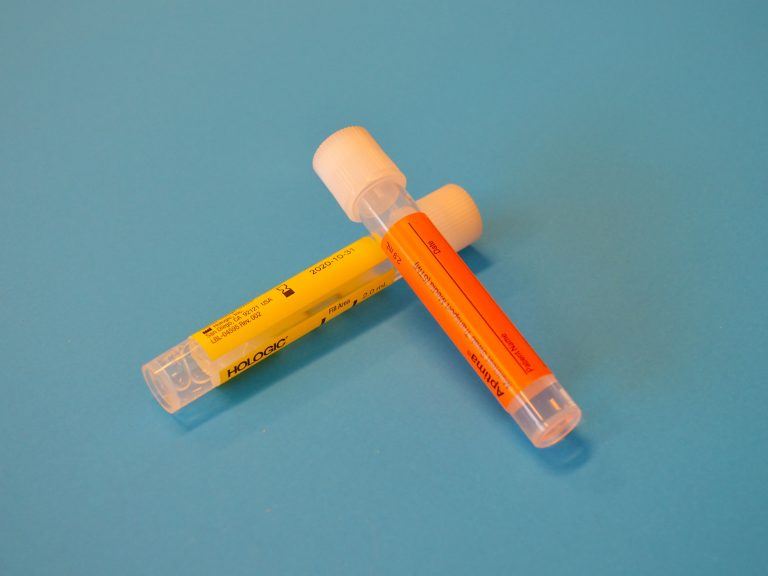HIV Testing and Results
Getting Tested for HIV
The first and most important step in HIV prevention is regular testing. If you are sexually active and having unprotected (i.e. vaginal or anal sex without condoms) or you’re sharing needles with others we recommend a test at least every six months to a year. If you are living with HIV early testing and treatment can be the key to living a long and healthy life. There are a number of options available for testing and things you should know during each stage of the process.
Types of Tests
There are three types of tests available; the rapid and standard test detects antibodies in your blood where the early HIV test detects the virus. In addition to accessing an HIV test many clinics and points-of-care will offer anonymous testing.
- The Standard HIV test can be used for routine testing or when the Rapid HIV test is not available. The Standard HIV test detects HIV antibodies in the blood.
- The Rapid HIV test is useful for routine testing and/or if you don’t want to wait several days for the results. The Rapid HIV test detects HIV antibodies in the blood. Most people (about 90%) will develop enough HIV antibodies to be detected three to four weeks after infection. The Rapid HIV test gives you a result in a few minutes, eliminating the stress of waiting a week for results.
- The Early HIV test is useful if you’ve had a recent risk incident (anal sex without a condom with someone whose status was different or unknown) or a known exposure to HIV. The Early test reduces the window period (the time you have to wait before getting tested) to only ten to 12 days. The Early HIV test looks for the actual HIV virus, not antibodies produced in response to the virus. That means the test can detect if you are infected when you are still in the window period of an antibody test.
Before you get tested
An HIV test can feel nerve wracking and even if you don’t think you’re at risk for contracting HIV the test results may still feel daunting.
- Is it important that before you get tested you under-go a “pre-counseling” session.
- You have a choice of HIV tests to take:
- If you’re getting an HIV test at a public health clinic you may be able to have an anonymous test. This means you are not required to give your name or other contact information. Anonymous HIV testing is only offered at 50 anonymous testing sites across the province (see the link below to find an anonymous clinic in your community).
- If you are getting an HIV test from your doctor or other healthcare provider you are should be eligible to take a test using your name (nominal) or using a code (non-nominal). You can request either type of test from your from your health care provider.
- Your nurse or whoever is administering your test will walk you through some of your options should you test positive.
- It’s important to know that most everyone feels some anxiety before undergoing testing; it’s normal. The best way to combat that anxiety is to get tested and know your HIV status.
- Follow this link to find an HIV testing clinic in your community – sexualhealthontario.ca/find-a-clinic
During your test
Each of the above tests draws varying amounts of blood; they are all relatively quick and painless.
- The Rapid test uses a blood specimen taken by a quick prick of your finger and then drawing blood. The Rapid test is just as accurate as a Standard HIV test, but you will have results within minutes.
- The Standard test’s big difference is that it is done with blood drawn from a vein just like the early test. The blood is sent to a lab and you will have to wait up to five days for the result.
The Results
Unless you take the rapid test you’ll have to wait at least couple of days for your results.
- If you’ve taken the standard test and you’re waiting for your results, do your best to be patient and do activities to reduce your stress.
- If your health care provided didn’t schedule a follow-up appointment after your test follow up to schedule one for your results and post-test counselling.
- If you test negative you still need to practice safer sex. Remember to always exercise caution and use a condom for anal and vaginal sex if you don’t know your partner’s HIV status.
- If you continue to engage in unprotected (anal or vaginal sex without a condom) after your test think about getting a test again (within six months to a year).
If you’ve tested positive we recognize that you may be shocked and uncertain what to do next. Consider reaching out for support from agencies like Black CAP to get the help you may need and advice about who to tell, when to tell them and what to do next. Remember that many people live long and happy lives with good treatment and care. If you have tested positive for HIV and want to know how to live with HIV there is more information on our Living with HIV page.


 BLACK COALITION FOR AIDS PREVENTION
BLACK COALITION FOR AIDS PREVENTION
